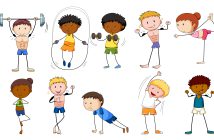Disease prevention and awareness are the responsibility of all parents. It’s also easier said than done. Anyone with a young child knows that illness spreads like wildfire in Kindergarten classrooms all across the planet.
But as a parent, your job isn’t just to avoid excessive trips to the pediatrician’s office (and a good thing too, because that would be a losing battle). It’s to give your child the foundation they need to secure long-term health and wellness.
That means equipping them with the knowledge to prevent and treat disease. In this article, we look at why and how you should educate your child about diseases.
Vaccine Awareness
Vaccines are an important aspect of healthy childhood development. The reason we no longer have outbreaks of things like Smallpox is because children are inoculated early on. And yet despite the proven benefits of childhood vaccinations, there is a significant amount of hesitancy and misinformation in circulation.
While epidemiologists do their best to educate the public, there are still common misconceptions that keep many people from vaccinating their children. Myths include:
- Vaccinations cause intellectual/social development delays. While vaccines do have a low risk of side effects—something you certainly should talk to your child’s doctor about— there is no proven association between vaccines and intellectual or emotional developmental delays.
- Vaccines don’t even work! People still get the flu/Covid/ etc! It is true that vaccines do not always perfectly eradicate a disease. However, they do reduce the spread and diminish the impact of sickness. People who have been vaccinated against the flu or Covid usually don’t get very sick if they happen to catch the illness anyway.
It’s also worth noting that viruses mutate. This is due largely to what experts refer to as “copying errors.” As the virus replicates, subtle alterations take place. Given enough time, these alterations can result in a vaccine resistant disease strain. Consequently, vaccines are periodically tweaked or redeveloped to take into account the most active strain.
- It’s healthier to develop natural immunity. Natural immunity is certainly a valuable asset in your body’s disease-fighting tool kit. It can go a long way toward protecting you from re-infection. However, there are several reasons why you shouldn’t rely on it when vaccines are available. For one thing, you or your child’s natural immunity will not protect someone else from getting sick from you. Relying on natural immunity also isn’t always effective. You or your child can experience serious health outcomes resulting in hospitalization or even death.
Developing a sound understanding of how vaccines work and why they are important is an important step in keeping your child healthy. Below, we take a look at other reasons you should prioritize disease and health awareness at an early age.
Information is Power
Everyone who was trying to make decisions during the height of the pandemic learned this firsthand. Do I have to wash my groceries? Let them detox in the foyer before I put them away? Is six feet enough distance or should I make it ten? Should I even be here at all?
Guidelines changed over time to coordinate with the newest understanding of the facts, as well as reflect the latest treatment developments.
People who knew what was going on were able to make decisions based not just on their whims, but on science.
Your children deserve that same opportunity. They may not be living through a pandemic anymore, but they are incubating in a cesspool of germs that we affectionately call “grade school.”
Oh, the germs! The coughing, the sneezing. The vague stomach viruses that always seem to kick into high gear right around midnight, passing from one child to the next so that it seems you lose an entire month just to cleaning up vomit, and—
Well. You get the picture. Kids don’t make many choices for themselves but disease prevention actually is one of them. They spend a great deal of time in close quarters with (often unhealthy) peers. An understanding of diseases, what the risks are, and how they spread, can equip your child with the power they need to make responsible choices for their health.
Builds Life-long Habits
When kids make that murky transition into adulthood they do so with virtually none of the requisite survival skills. Oh sure, they maybe know how to make a simple meal here and there. Pay their phone bill on time, and so on.
But a lot of their personal development is the product of trial and error. That’s ok for some things, but not health. They should enter adulthood with a firm understanding of how to avoid disease— not just in terms of hygienic habits, but also in lifestyle choices. Exercise. Diet. Carcinogen avoidance.
Often, people don’t start taking their health seriously until they have already experienced a scare. By then, sometimes permanent damage has already been done. By talking to your children about their health early on, you can help them build good habits that they will carry with them into adulthood.
How to Have the Conversation
Health and disease awareness does not need to be a frightening or even formal conversation. It can be something that comes up organically. Every time your child goes in for a new vaccine, talk to them about what they are getting and why it is important.
Explain the importance of various hygienic measures. Talk about the foods you eat. Why fruits and vegetables matter. Why exercise is important, and so on.
Context is a critical component of long-term learning. When you can connect a lesson to something that your child understands easily, it becomes significantly more likely that they will internalize the lesson.




